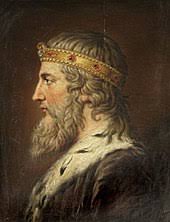King Alfred’s fight to save English.

In Melvin Bragg’s ‘The Adventure of English’ we see a lot of different accounts of the trials and tribulations of the English language as well as a number of its victories and losses. Its origins and its process of evolution. Arguably the most important event of this journey is the battle of Wessex and the efforts of King Alfred to save the English language.
“As far as England is concerned, the language that become English arrived in the fifth century with the Germanic warrior tribes from across the sea. (Bragg 1). A group of mercenaries whom invaded to fill up room left by the Romans and take any spoils left over. At first glance that doesn’t seem like it is too big of a deal, but they would have a lasting impact on the language that would eventually shape the world. Among the invaders were the Saxons, Angles, and Jutes all of which would in some shape or form be absorbed by the English language and be used to further its influence. “There had been luck, but also cunning and the beginnings of what was to become English’s most subtle and ruthless characteristic of all: its capacity to absorb others” (Bragg 2).
In CE 850 a fleet of Danish ships makes landfall upon the English cost and began a plundering spree across the country. During this time, its England would see the majority of its kings killed, and two that were sacrificed as offerings to Odin in a ritual know as the blood eagle. A process of ripping the ribs from the spine and pulling the lungs through the openings in order to make wings. There was one English king that was able to avoid the fate of his fellow countrymen. Alfred The Great.
King Alfred was the ruler of the one place in England that the Vikings were not able to fully destroy, Wessex. When Alfred first took the throne after his brother’s death he paid the Vikings to leave Wessex alone, but he knew it would be a temporary solution and after the enemy’s departure he immediately set about rebuilding the towns, entrenching fortification and raising a new army.
The Danes went on to conquer the other three most powerful kingdoms of England East Anglia, North Umbria, and Mercia and returned to the only Old-English speaking kingdom left in England, Wessex. In 875 CE a group of Vikings found their way inside the kingdom and entrenched themselves in Dorsetshire. Over the course of a few years more Viking hordes would follow suit and shatter the kingdom of Wessex, leaving it subjugated to Danish rule. Alfred escaped, however, and hid in the marshlands of Somerset accompanied only by a few loyal men. A king on the run in his own land.
While Alfred was in hiding he spent his time fortifying the marshes by building strongholds between the Parret and Tone rivers by using the natural barriers of the rivers so that he could build a bridge for his men to have easy access to the forest in order to gain food. Alfred would make use of the local farmers as a means to keep tabs on the movements of the Danes and is said that Alfred even went as far as to infiltrate an enemy camp himself to spy on the enemy army. This lasted for a whole winter, until spring of 878 when he was finally ready to make his move against the Danes.
During this spring Alfred launched an attack on a local Viking camp at Eddington beating the Danes back all the was to their fortification at Chippenham, where they were faced with a decision. They could stay and starve to death and Chippenham, or they could sign a treaty with Wessex. The treaty would be known as the Treaty of Wedmore and would divide the island of England in two: “To the East, between the Rivers Thames and Tees, lay Danish territory known as the Danelaw. The remaining Anglo-Saxon kingdoms unified under King Alfred.” (British Heritage 65). Alfred orchestrated arguably the greatest military comeback in the history of English as well as unified the English into a single nation, the feats that would earn him the title of Alfred The Great. “More than any other single individual, Alfred created the country we know as England.” (British Heritage 65).
Alfred would still have to deal with the small Danish skirmish now and again, but nothing to the degree of the great war. During this time of relative peace Alfred advocated for education in English rather than Latin, though he did encourage those wanting to pursue the Holy path to continue their education in the language of Latin. Alfred also had court-centered program of translating books he believed all men should know into English and it is said that Alfred even translated some works into English himself.
Although Alfred’s main contributions to the English language may not have come until the later days of rule as king, it cannot be stressed just how important Alfred’s actions were to not only the evolution of the English language, but also the very survival of it. Without his triumphant victory it is possible that the English language we know today would be drastically different, if it even still existed.
Hale, Robert. Harold the King. Great Britain. Piers Compton. 1961. Print.
Hargon, Jim. “King Arthur Slept Here!” British Heritage 2008: 34-9.ProQuest Research Library. Web. 20 Nov. 2011.